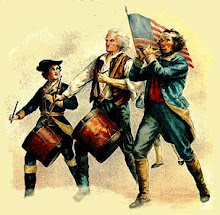Last week, I finished reading American Lion by Jon Meacham. It is a colorful and enlightening read about a fascinating man. Rather than piling on minute biographical details, Meacham strives to present Jackson's life and doings in broader terms. His book is just as concerned with American politics during the 1830s and 1840s as it is with Jackson's personal doings.
President Jackson, the sixth of our nation's chief executives, was a strange blend of southern gentleman, warlord, kindly grandfather, and violent sociopath. When he wasn't literally playing Santa Claus at Christmas, bringing bundles of presents to D.C.'s orphans, he was horsewhipping his political foes and purging the southern states of their Native American inhabitants. With one hand, he drove the Native Americans on to a western death march; with the other, he chastised big bankers in the name of making America a better place for the downtrodden.
If you consider Jackson the first modern Democratic president (I use that term loosely here), a fascinating progression can be seen. Jackson was a big-government, federally-minded ruler, who expanded executive control over the country and sought to put capitalist "fat cats" into place. His dismantling of the National Bank is an eerie forerunner to the meddlesome regulatory ways of President Obama. However, Jackson was more politically incorrect than mostly any other president in the nation's history. His Indian removals are the fodder of public school moralizing (rightfully so). He saw absolutely no value in racial equality, and considered abolitionists a danger to the country.
In addition, he believed firmly in the use of violence and force to bend and break his opponents, be they tribal, international, or personal. If Jackson didn't like you, he might just shoot you, horsewhip you, or challenge you to a duel. As an army general, he even carried out unauthorized military actions against foreign powers (imagine if General McChrystal marched into Iran and destroyed the place without consulting the White House first). The tenderness of Jackson's domestic life is almost silly in its polar opposition to his public persona.
No doubt he was a complicated man. In my opinion, he is too complicated for the age of the soundbite. That is why Meacham's book is so fascinating: ultimately, we don't know what to do with President Jackson. Progressive politics have marched so far beyond anything he could have imagined that his own Democratic successors are afraid to even mention him.
Politicians today will cite Lincoln, Washington, Jefferson, Reagan, and FDR as they try to position themselves. No one ever mentions Jackson. Libraries, colleges, and streets are named after the aforementioned, but far fewer landmarks and roadsigns bear the sixth president's name.
It is not for lack of importance that we leave him out of the presidential superstar club. In particular, Jackson left an indelible mark on the character of the executive office (one that subsequent presidents did not live up to; nobody remembers Martin Van Burn, John Tyler, or James Buchanan precisely because their vision of the presidency was less proactive than Jackson's). His use of the veto was hugely controversial in a time when American presidents were expected to let Congress do the lion's share of the governing.
Rather, it is the discomfort of his legacy that leaves Jackson on the back burner. Jackson was not unlike Obama, in that his basic governing philosophy called for massive federalization with anti-capitalist rhetoric. But you will never see Obama refer to himself as "a member of the party of Jackson". The racial and personal issues surrounding Jackson are too insurmountable.
What would Jackson think of the Democrats of today? He might be vaguely impressed with their social programming. He would also think that they were a pack of wimps, and it is not a stretch to imagine him firing pistols at them.
Subscribe to:
Post Comments (Atom)

No comments:
Post a Comment